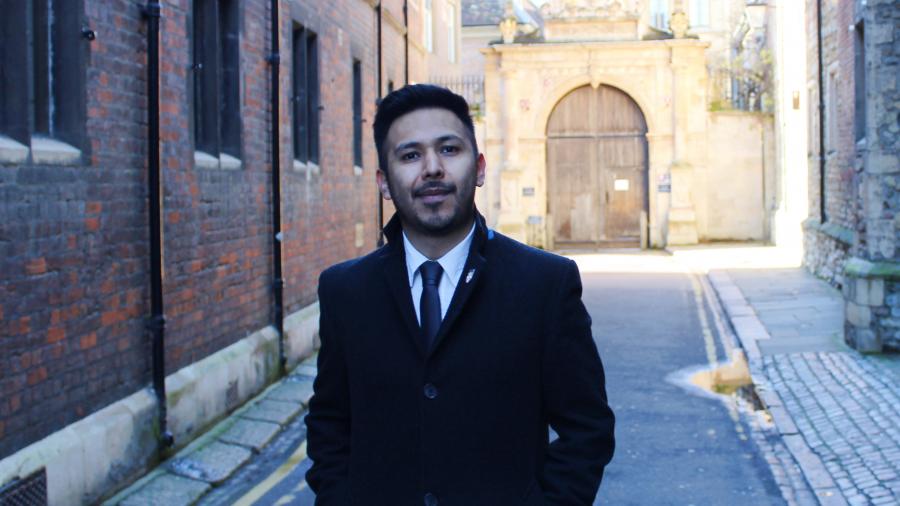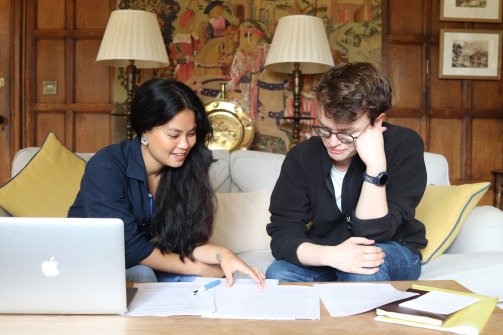The politics of time with Carolyn Smith


Eight new Junior Research Fellows (JRFs) have joined Wolfson College, bringing with them a broad range of subject specialisms, spanning psychiatry, microbiology, biochemistry, biotechnology, modern German history, epidemiology, geriatric medicine, environmental physics and ice core science.

Junior Research Fellows are a key part of the College, making the College home to a vast spectrum of world-leading research, representing multiple University departments and coming from diverse international backgrounds.
Each year the College offers up to ten non-stipendiary JRFs, awarded on the basis of an open competition. Fellowships are for research at postdoctoral level and are open to scholars in all subjects and all disciplines. The competition for next year will be advertised from July 2021 on the Wolfson JRF page.
Jane Clarke, Wolfson College President, said: “Junior Research Fellows are valuable members of our community, reflecting the central importance of research in the life of Wolfson College. It’s exciting to see such an excellent group join us, from a broad range of subject areas.
“They join us at a time when research, as we know it, is more difficult than it has been. For researchers across the world, there are restrictions on labs and libraries, foreign travel and funding. We are, however, well placed at Wolfson to offer them the support, the intellectual and cultural exchange, and the welcoming community necessary to flourish. We can’t wait to see what they do next.”
Dr Godwin Aleku works at the interface of synthetic organic chemistry and industrial biotechnology. His research focuses on developing sustainable and clean approaches to pharmaceutical synthesis. He is a Leverhulme/Isaac Newton Early Career Research Fellow at the Department of Biochemistry. Full bio.
Dr Adrian Cazares is a microbiologist and genomicist who is interested in the evolution of bacterial pathogens and their mobile genetic elements. His work has combined state-of-the-art experimental and computational approaches to investigate the evolution of plasmids and antibiotics resistance. He is a member of the Microbiology Society and the International Society for Microbial Ecology (ISME). Full bio.
Dr Nicholas Evans is a Clinical Lecturer and Honorary Specialist Registrar in Stroke and Geriatric Medicine. His research involves imaging of the brain and blood vessels in individuals with cerebrovascular disease and stroke. Nicholas is the Chair of the Trainee Committee at the British Association of Stroke Physicians (BASP). He also serves on the Executive Committee at BASP, as well as the Joint Clinical Neurosciences Committee at the Royal College of Physicians. Full bio.
Dr Jessica Fritz is a Research Associate in the Department of Psychiatry. Jessica lectures and supervises for the department, focusing on the Risk and Resilience Module of Psychological and Behavioural Sciences. Full bio.
Dr Helene Hoffman is a Physicist specialising in Environmental Physics and ice core science. She focuses on paleoclimate studies, and is part of the European Research Council (ERC) funded project, Warm Stability of the West Antarctic Ice Sheet in the Last Interglacial (WACSWAIN). She is Postdoctoral Research Associate at the Department of Earth Sciences. Full bio.
Dr Erika Ikeda is a Postdoctoral Fellow in the Centre for Diet and Activity Research (CEDAR) and the MRC Epidemiology Unit. She teaches in the Department of Public Health and Primary Care, and supervises MPhil and PhD students. She is a member of the International Society for Physical Activity and Health, the Society for Social Medicine & Population Health, and the Cambridge Metabolic Network. Full bio.
Dr Tom McCoy is a surface/colloid scientist and Oppenheimer Research Fellow in the Department of Chemical Engineering and Biotechnology. His work includes a project to explore the mechanism of friction reduction and anti-wear caused by small molecule additives in engine oil formulations using neutron reflectivity. Full bio.
Dr Darren O’Byrne is a historian of modern Germany. His research explores German politics, government, and administration from 1871 to the present, as well as the immediate and lasting effects of regime-change in the twentieth century. He is working on his first book, an interdisciplinary study of the civil service in Weimar and Nazi Germany. Full bio.







